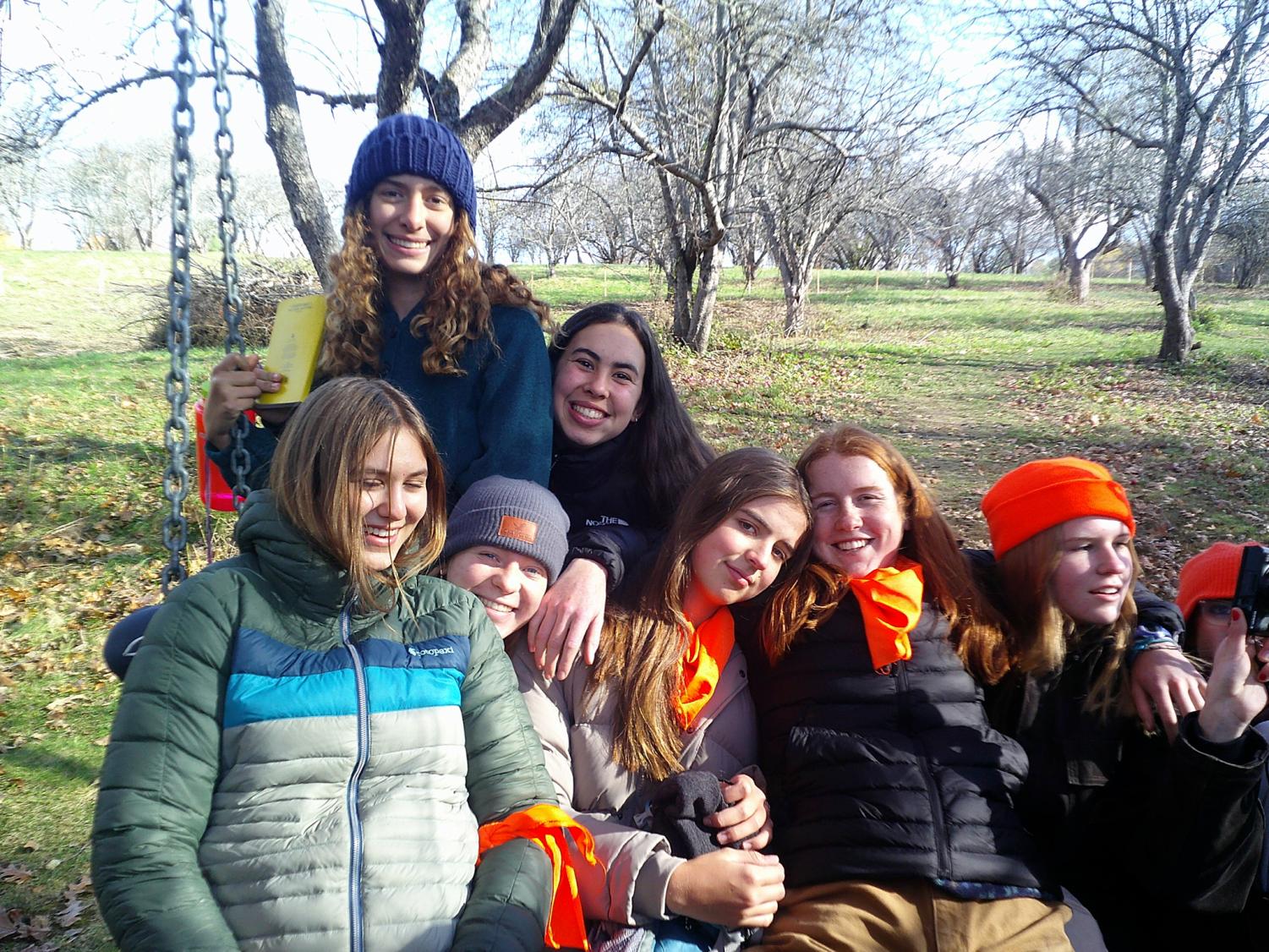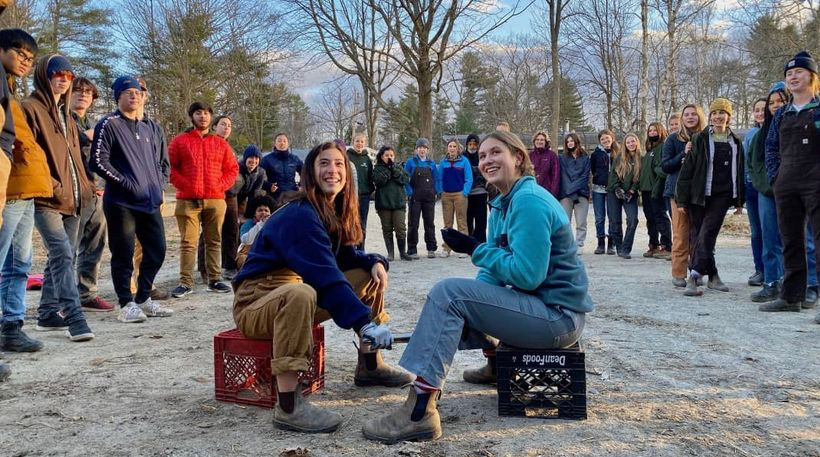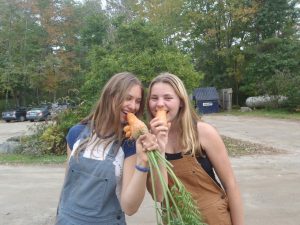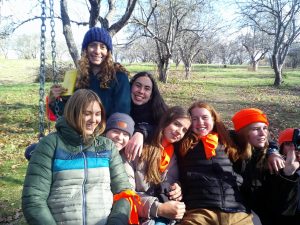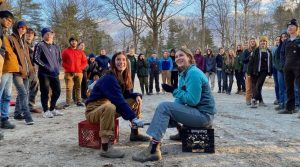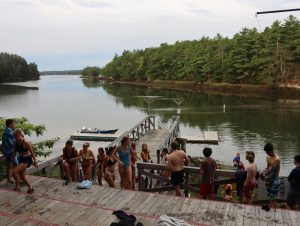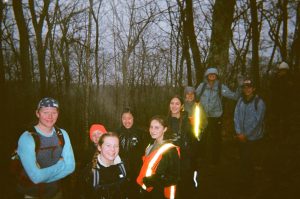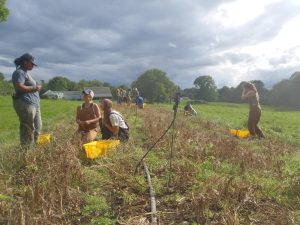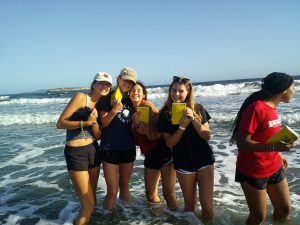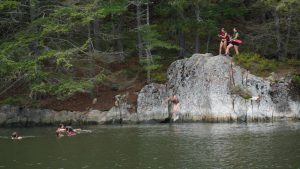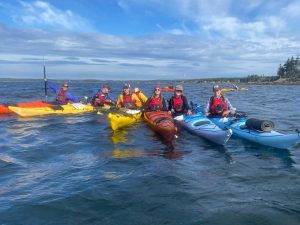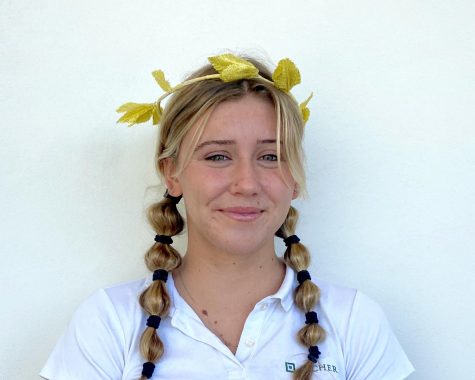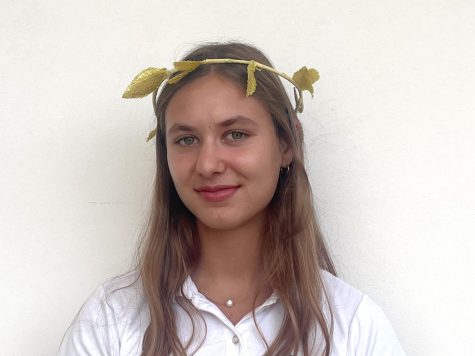By Thea Leimone, Features Editor
February 16, 2022
-
Tiles, her guide and group members pose on kayaks during a week-long kayaking expedition. “We ended up doing 25 miles of kayaking that day, which was just insane and I think we were sitting for 10 hours straight because there was not a safe place to beach,” Tiles said. “It was a beautiful day and we were really fortunate to round that because that’s one of the most open points in Maine.”
-
Eliza Tiles and her friend pose with two of the nearly 400 pounds of carrots their group farmed that afternoon. “So you’re in the field with overalls that are super muddy. It’s a super fun process. One person basically takes a shovel and jams it into the ground to loosen up the dirt,” Tiles said. “Then the next person pulls up the carrots … then we move them into bins and have this huge group washer.”
-
At a Native historical site, Tiles poses with friends during one of their Tuesday field labs at Shell Midden. “Native Americans would eat … basically their main diet was all the shells from clams, oysters, and then they basically throw all these oysters on huge piles on the side of riverbanks,” Tiles said.
-
Here, Tiles grabs a wrench in a farm trivia activity. After finals and during their last week on campus, the students participated in “Farmer Olympics,” where they played various farm-related competitions. “I actually won that one and I think the question was ‘how many push brooms are in the barn?’ and we would know that from having to sweep the barn floor after everyday chores,” Tiles said.
-
Students line the deck for their first polar plunge, held every Saturday for willing participants. “Even when it was like negative 20 degrees in Maine and snowing, you wake up 20 minutes before breakfast and you just dip in,” Tiles said. “Everyone — I think there’s only like five people in semester that didn’t show up for the first one and eventually as the semester goes on, you find the regulars.”
-
From the Thanksgiving week activities, Tiles and a group hiked up a mountain in heavy rain. “We got to the top of the summit, and you couldn’t see a thing because it’s cloudy but we’ve been hiking for two hours,” Tiles said. “We came back in the dark, but it was really fun because it was towards the end. I was able to hike with most of the people that I hadn’t really talked to a lot.”
-
During her first week on campus, Tiles and her group partook in their first work program where they harvested dried peas. “It was very monotonous and it was a lot of fun,” Tiles said. We ended up in groups of two, racing down each road — so you could get as many [peas] — it’s all about handwork, you have to find some games to play.”
-
Tiles and her friends pose in the water during their second field lab at Morse Mountain, Maine. Students took notes of observations in their yellow field lab notebooks.
-
Tiles and friends jump off a small cliff during an activity she organized. “I had to ask people who worked [to lifeguard] … and I was scared to talk these people I didn’t know,” Tiles said. “I had to find the tides, and it ended up being a king tide. There was a super high tide and we swam over in this freezing cold water — I was able to jump off, and it was so super fun.”
-
Tiles, her guide and group members pose on kayaks during a week-long kayaking expedition. “We ended up doing 25 miles of kayaking that day, which was just insane and I think we were sitting for 10 hours straight because there was not a safe place to beach,” Tiles said. “It was a beautiful day and we were really fortunate to round that because that’s one of the most open points in Maine.”
-
Eliza Tiles and her friend pose with two of the nearly 400 pounds of carrots their group farmed that afternoon. “So you’re in the field with overalls that are super muddy. It’s a super fun process. One person basically takes a shovel and jams it into the ground to loosen up the dirt,” Tiles said. “Then the next person pulls up the carrots … then we move them into bins and have this huge group washer.”
Farming at 6 a.m., 48 hours in the wilderness alone, week-long kayaking, field labs and identifying every species on 400 acres off the coast of Wiscasset, Maine. These activities filled junior Eliza Tiles’ semester abroad with the Chewonki Foundation. The program is available to juniors for either a fall or spring semester. There, Tiles continued her academics throughout the rest of the semester, from taking AP U.S. History, to long field labs in the wilderness.
Tiles was inspired to attend the semester program by Billie Newmyer (’21), who took an entire year abroad to attend both Chewonki and Segl in Washington D.C.
“I decided to do the program when I heard about it from Billy Newmyer in eighth grade. My grandma lives in Maine, so I grew up going there and [I’m] in love with the place and then I just wanted to be there. I think I always had to be out of L.A., to see the seasons or just experience something different,” Tiles said. “I knew the person that I wanted to be, but I feel like being in L.A. was really holding me back. So I was able to go to this community that was very crunchy. I took away a lot about myself … I really know who I want to be and the way in which I want to approach life.”
Aside from outdoor field labs, expeditions and hikes, students were given an individual plot of land located on the 400 acres in the program. Students would return to their plot each Sunday to record observations on a given prompt.
“It was all about watching the change of time over the seasons in this one place. It was your own, so that was a really special place for me on campus because I got to go back,” Tiles said. “When you have that independence of just you for that hour, which is super hard to find when you’re living with people — it’s the same people for three-and-a-half months — you can’t really get a lot of your own space, so that was a lot of fun.”
To culminate the skills they had cultivated over the first weeks of the semester, students were sent out on a 48-hour solo trip in a location unknown to them until arrival. Tiles was given a hammock, tarp and food, and brought along her own books and journal to set up individual camp.
“I was proud of myself for being able to do things that I couldn’t appreciate or share with anyone else but myself,” Tiles said. “And I remember sitting there like, I have to be content with [the idea that] I’m the only one that just saw that bald eagle. I’m not going to show it to anyone and I think those were like some of the biggest moments … You leave, you’re on your own but then you still come back to embrace this community.”
Various other programs like Chewonki exist throughout the country for high schoolers to take a semester to explore the outdoors as well as themselves. Tiles was able to transfer back to Archer for her second semester of junior year and hopes that other girls will be able to do the same.
“A lot of my friends were from all over America, but a lot of them, their schools have officials from these [semester] schools come and advertise. Like hey, look at this program, but Archer doesn’t,” Tiles said. “I was going to go to Pali[sades High School] second semester, but I ended up being able to come back, which I’m super grateful for.”





